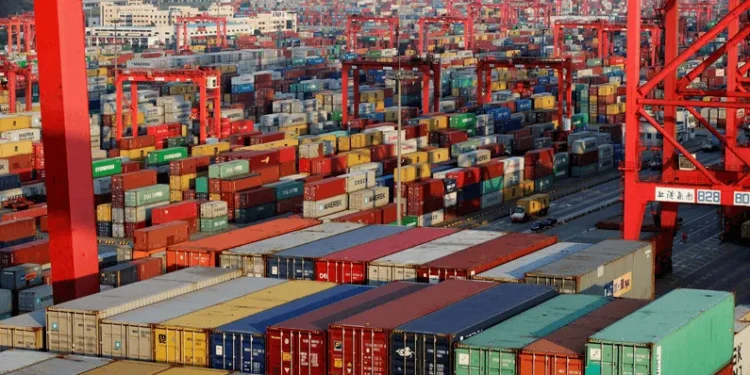Nigeria’s trade relationship with China has been steadily growing, with China becoming a key supplier of many of Nigeria’s imported goods.
From machinery to chemicals, China plays a crucial role in fueling sectors such as healthcare, manufacturing, construction, and technology.
These imports support Nigeria’s industrial and infrastructure development, but also bring challenges like trade imbalances and the need for a stronger local manufacturing base.
Understanding these imports can shed light on Nigeria’s economic priorities and areas where domestic production could be enhanced.
Below are the top 10 products Nigeria imports from China, according to trading economics:
1. Machinery, Nuclear Reactors, and Boilers – $3.01 Billion
Nigeria’s industrial growth is heavily reliant on machinery imported from China, including power generators, industrial boilers, and heavy-duty equipment for construction and energy production. These imports are vital for industries like oil refining, cement manufacturing, and agriculture, improving productivity and reducing operational costs. There is potential to reduce reliance on imports by fostering local machinery production, which could benefit Nigeria’s economy.
2. Electrical and Electronic Equipment – $1.80 Billion
Electrical and electronic goods from China include items such as household appliances, industrial devices, and communication tools like smartphones, transformers, solar panels, and air conditioners. These products help bridge Nigeria’s energy gap and improve access to technology. As urbanisation increases, demand for affordable, energy-efficient electronics continues to rise. Strengthening local electronics manufacturing could spur economic diversification and create jobs.
3. Unspecified Commodities – $686.60 Million
This category encompasses a broad range of goods, often raw materials or intermediate products used in industries such as textiles, construction, and agriculture. These unspecified imports reflect Nigeria’s growing dependency on China across multiple sectors. Improved clarity in trade data would help Nigeria devise targeted trade policies to foster industrial growth and improve economic planning.
4. Vehicles (Other Than Railway and Tramway) – $674.86 Million
Affordable vehicles, motorcycles, and spare parts from China support Nigeria’s transportation sector, which is vital for logistics and e-commerce. Commercial vehicles like buses and trucks are essential for growing transport networks. However, the heavy reliance on imports limits the growth of Nigeria’s automobile industry. Expanding local vehicle assembly could reduce trade deficits and create job opportunities.
5. Paper, Paperboard, and Related Products – $504.96 Million
China is a key supplier of paper products, including packaging materials and printing paper. The rise of e-commerce has driven demand for packaging, leading to greater imports of paper products. However, high import costs and currency fluctuations pose challenges for Nigeria’s printing and packaging sectors. Strengthening local paper production could reduce foreign dependency and lower costs for businesses.
6. Articles of Iron or Steel – $499.16 Million
Iron and steel are vital to Nigeria’s construction and manufacturing industries. These materials are used in building infrastructure like roads, bridges, and skyscrapers. Despite heavy imports, there is significant potential for Nigeria to expand its steel production. Investing in local steel plants and mining iron ore could reduce import dependence and stimulate industrial growth.
7. Plastics – $448.04 Million
Plastics are essential for a variety of sectors, including packaging, agriculture, and construction. China supplies a wide range of plastic-based materials, such as water bottles, pipes, and synthetic fabrics. While these imports support manufacturing, the country also faces challenges related to plastic waste and environmental pollution. Developing a robust recycling industry could reduce import dependency and promote sustainability.
8. Optical, Photo, Technical, and Medical Apparatus – $403.09 Million
Nigeria imports essential medical equipment, laboratory instruments, and optical devices from China to support healthcare services. Items such as X-ray machines, microscopes, and surgical tools are critical for advancing medical care. However, limited local production of such high-tech medical equipment increases the country’s reliance on foreign imports. Expanding local manufacturing could enhance Nigeria’s self-sufficiency in healthcare technology.
9. Miscellaneous Chemical Products – $392.67 Million
Chemicals, including industrial solvents, paints, adhesives, and cleaning agents, are widely imported from China. These products support sectors like agriculture, pharmaceuticals, and manufacturing. Strengthening Nigeria’s domestic chemical industry could reduce foreign reliance and boost sectors like food processing and construction. Encouraging investment in chemical production is vital for reducing trade imbalances and supporting industrial growth.
10. Organic Chemicals – $265.99 Million
Organic chemicals, such as compounds used in pharmaceuticals, agriculture, and industrial applications, are essential imports for Nigeria. These chemicals support the country’s growing pharmaceutical industry and agricultural needs. However, Nigeria’s limited local chemical production capacity highlights a need for more investment in research, innovation, and local manufacturing, which could help reduce import costs and enhance economic independence.
These top 10 products illustrate Nigeria’s reliance on imports from China and the potential for strengthening local industries to reduce this dependency and promote sustainable growth.











